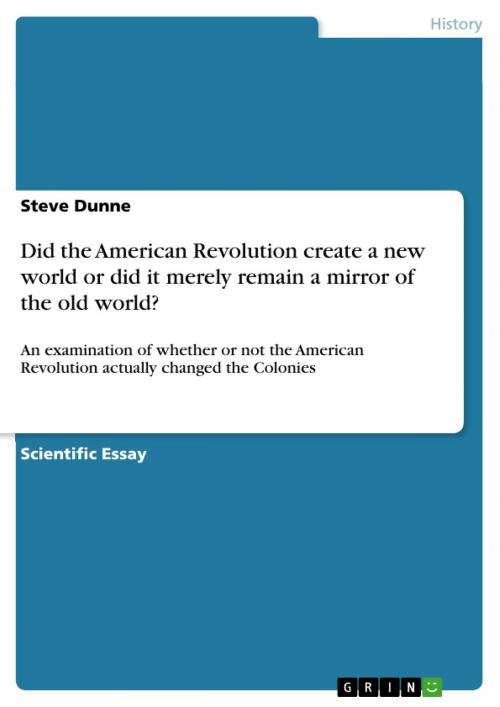Did the American Revolution create a new world or did it merely remain a mirror of the old world?
An examination of whether or not the American Revolution actually changed the Colonies
Nonfiction, History, Americas, United States| Author: | Steve Dunne | ISBN: | 9783656060833 |
| Publisher: | GRIN Verlag | Publication: | November 18, 2011 |
| Imprint: | GRIN Verlag | Language: | English |
| Author: | Steve Dunne |
| ISBN: | 9783656060833 |
| Publisher: | GRIN Verlag |
| Publication: | November 18, 2011 |
| Imprint: | GRIN Verlag |
| Language: | English |
Scientific Essay from the year 2011 in the subject History - America, , course: American Revolution, language: English, abstract: On 4th July 1776, outside Independence Hall, Philadelphia, the first official reading of the Declaration of Independence commenced and for the first time the American people heard the immortal lines; 'We hold these truths to be self-evident, that all men are created equal, that they are endowed by their Creator with certain unalienable Rights, that among these are Life, Liberty and the pursuit of Happiness.' Such words followed the likes of 'Give me Liberty or Give me Death' in 1775 and the events of the Boston Tea Party in 1773 and the Boston Massacre in 1770. From such statements and actions, the risk and passion with which the colonists opposed the Crown before the War had even begun, it can be seen that a driving force behind the political movement ,the military revolution and the social reconstruction, was the concept of liberty and freedom from tyranny; 'But when a long train of abuses and usurpations, pursuing invariably the same Object evinces a design to reduce them under absolute Despotism, it is their right, it is their duty, to throw off such Government, and to provide new Guards for their future security.' Although this revolution did achieve the overthrowing of the British colonialist government, the extent to which the Founding Fathers were successful in creating the republic dreamt of in the hearts of the revolutionaries, rather than merely replicating the systems of colonial Europe, is a highly contestable issue. This essay shall seek to argue that the American Revolution did manage to achieve a 'new world', but that some mirroring was inevitable due to shared social concepts and political origins. Many of the goals laid down in the Declaration such as the 'unalienable rights' were accomplished with their enshrining in the Bill of Rights to the United States Constitution, ratified 15th December 1791. The perceived failures with the American Revolution, that it simply replaced the ruling elite rather than altering the concept of governing America, are merely the result that some goals were perhaps simply a step too far, both for the era and due to the corruptibility of human nature; one need only look at Benedict Arnold to observe such weaknesses. Politically, there was some mirroring; but only at the base level. Socially, America truly became a 'new world' with highly radical viewpoints on sections of society when compared to Great Britain. [...]
Scientific Essay from the year 2011 in the subject History - America, , course: American Revolution, language: English, abstract: On 4th July 1776, outside Independence Hall, Philadelphia, the first official reading of the Declaration of Independence commenced and for the first time the American people heard the immortal lines; 'We hold these truths to be self-evident, that all men are created equal, that they are endowed by their Creator with certain unalienable Rights, that among these are Life, Liberty and the pursuit of Happiness.' Such words followed the likes of 'Give me Liberty or Give me Death' in 1775 and the events of the Boston Tea Party in 1773 and the Boston Massacre in 1770. From such statements and actions, the risk and passion with which the colonists opposed the Crown before the War had even begun, it can be seen that a driving force behind the political movement ,the military revolution and the social reconstruction, was the concept of liberty and freedom from tyranny; 'But when a long train of abuses and usurpations, pursuing invariably the same Object evinces a design to reduce them under absolute Despotism, it is their right, it is their duty, to throw off such Government, and to provide new Guards for their future security.' Although this revolution did achieve the overthrowing of the British colonialist government, the extent to which the Founding Fathers were successful in creating the republic dreamt of in the hearts of the revolutionaries, rather than merely replicating the systems of colonial Europe, is a highly contestable issue. This essay shall seek to argue that the American Revolution did manage to achieve a 'new world', but that some mirroring was inevitable due to shared social concepts and political origins. Many of the goals laid down in the Declaration such as the 'unalienable rights' were accomplished with their enshrining in the Bill of Rights to the United States Constitution, ratified 15th December 1791. The perceived failures with the American Revolution, that it simply replaced the ruling elite rather than altering the concept of governing America, are merely the result that some goals were perhaps simply a step too far, both for the era and due to the corruptibility of human nature; one need only look at Benedict Arnold to observe such weaknesses. Politically, there was some mirroring; but only at the base level. Socially, America truly became a 'new world' with highly radical viewpoints on sections of society when compared to Great Britain. [...]















